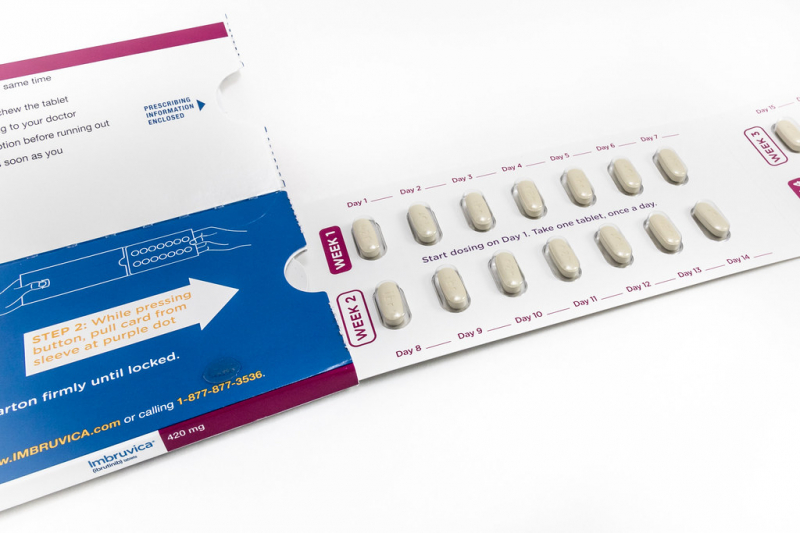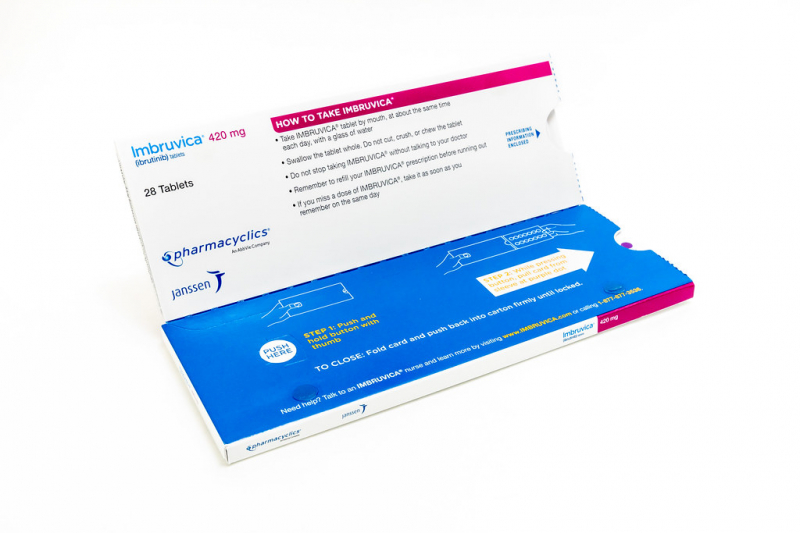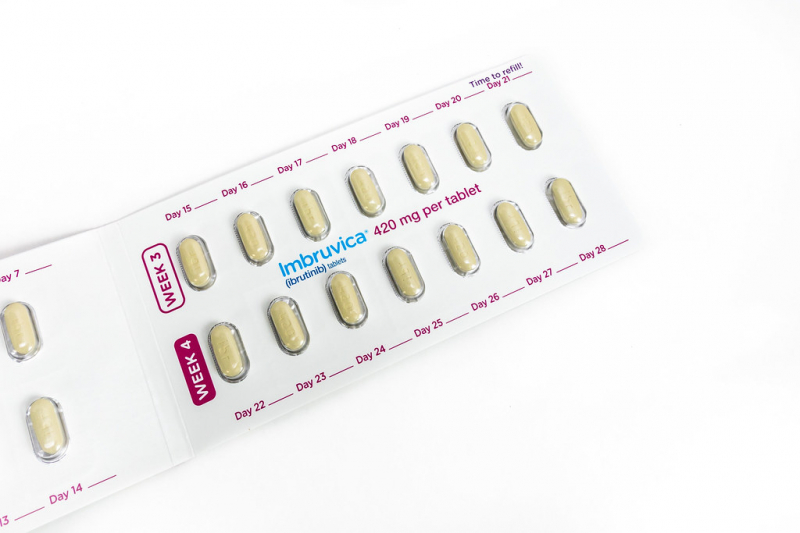Top 6 Things to Know About Imbruvica
Imbruvica is a medication that has become an important treatment option for various types of cancer. As with any medication, it is essential to understand its ... read more...benefits, side effects, and how it works to make an informed decision. Here are the things you should know about Imbruvica.
-
Imbruvica is a brand (trade) name for ibrutinib, a medicine used to treat a variety of cancers and graft versus host diseases.
Ibruvica (ibrutinib) acts by preventing the Bruton tyrosine kinase (BTK) enzyme from functioning. In some malignancies, particularly B-cell leukemias and lymphomas, BTK is a component of a critical signaling pathway. Imbruvica stops the signals that encourage cancerous cells to proliferate and divide uncontrollably by obstructing this pathway, ultimately leading to the death of diseased cells.
Imbruvica is a member of the group of drugs referred to as Bruton tyrosine kinase inhibitors. Another name for it is a targeted treatment.

Photo on Flickr (https://live.staticflickr.com/65535/48105990237_ae070a6447_b.jpg) 
Photo on Flickr (https://live.staticflickr.com/65535/48105921683_c41b6c6147_b.jpg) -
Before taking Imbruvica, as with any prescribed medication, it is critical to learn as much as possible about it. Your healthcare provider and pharmacist will provide you with important prescription information. When you first start taking this medication, pay attention to how you feel, and don't be afraid to seek help if anything seems off.
The good news is that Imbruvica has no contraindications, which means that there are no medical conditions that would preclude its use. However, taking other medications may impair Imbruvica's effectiveness. Notably, for MCL and MZL, this drug is only prescribed after all other treatments have failed.
Imbruvica may not be safe to take in certain circumstances, such as the following:
- Pregnancy
- Breastfeeding
- Heart disease
- Pediatric
- Liver problems
You must give your healthcare professional as much information as you can about your health situation.
Imbruvica belongs to a class of drugs known as kinase inhibitors. These inhibit the production of kinase, a protein linked to cancer development and immune response. There are numerous kinase inhibitors, which are classified according to their mode of action. The most notable are type I kinase inhibitors, which work by binding to active forms of kinase, and type II (of which Imbruvica is the first discovered compound). A variety of kinase inhibitors may be indicated for cancer treatment. In addition to Imbruvica, these include:
- Bosulif (bosutinib)
- Iressa (gefitinib)
- Jakafi (ruxolitinib)
- Sprycel (dasatinib)
- Sutent (sunitinib)
- Tarceva (erlotinib)
- Tykerb (lapatinib)
- Votrient (pazopanib)
- Xalkori (crizotinib)
- Zelboraf (vemurafenib)

Photo by freestocks on Unsplash 
Photo by Ksenia Makagonova on Unsplash -
You'll receive detailed instructions from your doctor on when and how much of this medication to take. Despite this, there are broad recommendations for use, and they differ greatly depending on the circumstance.
- MCL: A dose of 560 mg should be administered once daily till symptoms subside (or until side effects and toxicity are unbearable).
- CLL and WM: Once daily administration of 420 mg is advised for these diseases. To boost efficacy, Imbruvica is occasionally coupled with additional medications like bendamustine, rituximab, or others.
- Chronic graft vs host disease: For this situation, 420 mg should be administered daily until symptoms decrease (or until toxicity and side effects become too difficult).
All dosages listed are from the drug manufacturer and may need to be adjusted for your specific situation. Check your prescription and speak with your doctor to ensure you are taking the correct dose for you.
Imbruvica is available in a variety of strengths, ranging from a 70-mg capsule labeled "ibr 70" to a 560-mg oblong tablet labeled "ibr" on one side and "560" on the other.
Photo on Flickr (https://live.staticflickr.com/65535/48105868736_9b8649c87c_b.jpg) 
Photo on Flickr (https://live.staticflickr.com/65535/48105921683_c41b6c6147_b.jpg) -
To ensure that every prescription is effective, regular monitoring is necessary. Tell your healthcare practitioner right away if you're experiencing any side effects if you're taking this medicine. Remain careful; get medical help right away if you experience any serious adverse effects.
Imbruvica, like any pharmaceutical drug, can cause a variety of side effects. These are the most common:
- Diarrhea
- Tiredness
- Muscle and bone pain
- Rash
- Bruising
- Mouth sores (stomatitis)
- Muscle spasms
- Nausea
- Pneumonia
More severe adverse effects occasionally manifest. These are a few of them.
- Hemorrhage: Though relatively uncommon, severe bleeding events have been reported with this drug, occurring in up to 6% of cases. Notably, use has been linked to intracranial hemorrhage, gastrointestinal bleeding, blood in the urine (hematuria), and post-operative hemorrhage (excessive bleeding during and after surgery). Less severe bleeding occurs in 39% of Imbruvica users and is characterized by the presence of red welts or dots on the skin (petechiae) or easier bruising.
- Infection: In 21% of patients, the use of this medication has also been connected to certain viral, fungal, or bacterial illnesses. In particular, the viral infection known as progressive multifocal leukoencephalopathy, which affects the white matter of the brain, is worrisome. Pneumocystis jirovecii pneumonia, a serious fungal lung infection, may also develop.
- Cytopenias: Cytopenia is a condition in which one or more of your blood cell types are lower than normal. Reduced white blood cell levels, as with neutropenia or anemia, in which the body does not get enough oxygen due to a lack of healthy red blood cells, are especially concerning.
- Atrial Fibrillation: Imbruvica increases the possibility of abnormal heartbeats in those with atrial fibrillation and atrial flutter, among other diseases. This is especially dangerous for people with a history of heart disease, high blood pressure, or those who have this condition.
- Hypertension: About 19% of Imbruvica users have high blood pressure. Other medications may be required to help with this.
- Second Primary Malignancies: While you're on this medication, some other conditions and cancers could develop. Non-melanoma skin cancer is the most prevalent of these problems, which are thought to be present in 10% of cases.
- Tumor Lysis Syndrome: Tumor lysis syndrome is a rare condition seen in Imbruvica users in which tumors release their cells into the bloodstream, causing a variety of symptoms such as nausea, muscle cramping, vomiting, diarrhea, and fatigue.
- Embryo-Fetal Toxicity: Imbruvica may harm a growing fetus, according to research conducted on animals. The relative benefits and hazards of using this medication while pregnant are carefully weighed by healthcare professionals, who will also inform you of any risks.

Photo by Adrian Swancar on Unsplash 
Photo on Wikimedia Commons (https://upload.wikimedia.org/wikipedia/commons/f/f2/Types_of_Hematoma.jpg) -
Imbruvica can generally coexist with other drugs and substances. However, when used in conjunction with a class of drugs known as CYP3A inhibitors, dosages may need to be reduced. This includes a variety of prescribed medications, including:
- Clarithromycin (e.g., Biaxin)
- Diltiazem (e.g., Cardizem, Tiazac)
- Erythromycin (e.g., Erythrocin)
- Ritonavir (e.g., Norvir)
- Itraconazole (e.g., Sporanox, Tolsura)
- Verapamil (e.g., Verelan, Calan SR)
- Ketoconazole (e.g., Xolegel, Extina)
- Voriconazole (e.g., Vfend)
- Posaconazole (e.g., Noxafil)
Furthermore, some other medications, foods, herbs, and supplements have been found to influence CYP3A inhibition, which may affect Imbruvica function. These are some examples:
- Goldenseal
- Phenobarbital
- Phenytoin (e.g., Phenytek, Dilantin)
- Rifampin (e.g., Rifadin)
- St. John’s wort

Photo on Flickr (https://live.staticflickr.com/65535/49809052356_7e06a857a6_b.jpg) 
Photo on Wikimedia Commons (https://upload.wikimedia.org/wikipedia/commons/a/ab/Phenytoin.frei.jpg) -
Patients need to take the medication at the same time every day with a glass of water. As a result, the tablet must be swallowed whole; it should not be chewed, crushed, or opened.
Take the missing medication for the day as soon as you remember if the patient forgets to take a dose. The following dose is administered on schedule the following day. To make up for a missing dose, do not take a second dose.
Avoid taking Imbruvica with grapefruit or bitter orange juice as it may intensify the drug's side effects.
Imbruvica has been linked to some unusual but serious side effects. If you have any unusual bleeding, severe headache, yellow skin, severe upper right abdominal pain, chest pain, edema, shortness of breath, heart palpitations, itchy skin or skin reactions, dark urine, or other concerning side effects, seek emergency medical attention or call your doctor right away.
See your doctor on a regular basis to have your blood pressure, liver function, blood counts, and other vital signs checked.

Photo on Flickr (https://live.staticflickr.com/65535/51868606377_b129656faf_b.jpg) 
Photo on Fshoq! blog (https://media.fshoq.com/images/216/doctor-showing-examination-results-to-the-patient-216-small.jpg)








